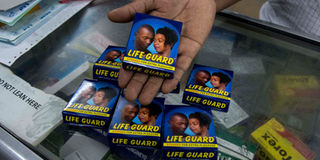How did faulty condoms end up in the market?

A pharmacist displays a pack of Life Guard condoms at his pharmacy in Kampala, Uganda on November 19, 2019. AFP PHOTO
What you need to know:
- The issue: Faulty condoms.
- Our view: It is a serious lapse on the part of NDA, as a regulator and Marie Stopes, as a dispenser for sleeping on their jobs.
The National Drug Authority (NDA) said it was investigating how faulty Life Guard condoms ended up on the Ugandan market. This came on the backdrop of Marie Stopes Uganda, a non-government organisation that offers reproductive health services, recalling two batches of Life Guard condoms from the market following customers’ complaints.
According to a letter issued by NDA, the condoms from batches 19040205 and 19050105 manufactured in April and May with expiry dates for March and April 2024, do not meet market standards. It is estimated that more than four million condoms produced in those batches will be affected. In a statement, Marie Stopes said the recent batches fell short of the quality demanded.
During routine post-market surveillance this year, NDA discovered that two batches of condoms were distributed despite failure to comply with the parameters. The parameters include quality of lubricant, and freedom from holes and bursting pressure.
According to NDA, those who could have used the condoms are at risk of attracting sexually transmitted diseases such as HIV/Aids. Now Parliament has asked the Health ministry to explain this serious lapse.
The recall of the defective condoms has caused panic among the users, with sections of the population asking what the ministry is going to do for people who could have contracted sexually transmitted diseases, or even got pregnant after using these defective condoms.
Marie Stopes’ explanation falls short of the reason as to why the defective condoms still ended up on the market. The health risks and its associated cost that may present in the event the condoms were faulty will be enormous.
NDA ought to tell the people what happens when a defective drug, or medical equipment, vaccine or health protective gear is inadequate. We believe when medicine or medical equipment does not meet set standards, there is a standard way of having the item not reach the market. We cannot then rule out an act of unscrupulous people within NDA and Marie Stopes, for their selfish reasons, putting back the defective items on the market for pecuniary benefits.
Health, unlike other sectors, has far-reaching implication when its dispensation is not effectively applied, and this is what regulators and dispensers ought to keep at the back of their minds.
It is, therefore, a serious lapse on the part of NDA, as a regulator and Marie Stopes, as a dispenser, for sleeping on their jobs. NDA, together with Parliament, need to get to the bottom of this matter because apart from the condoms, we need to understand what other defective drugs and item have ended up on the market.




